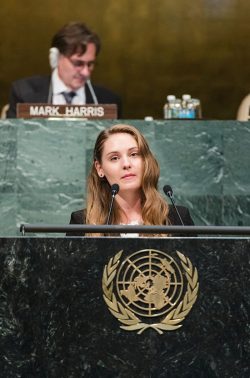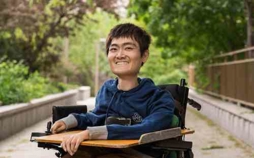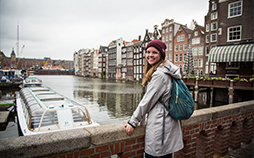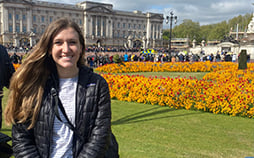Student from Japan Lives Lifelong Dream at BYU
A new scholarship honors the Ito brothers, whose cheerful perseverance has inspired many.
December 2016
Does public speaking make you nervous? How about public speaking in another language? BYU students Jamie Clegg and Rachel Lott don’t seem rattled: they recently spoke to the United Nations General Assembly—in Arabic.

Addressing the General Assembly
The two were among 60 winners of this year’s Many Languages, One World essay competition organized by ELS Educational Services and United Nations Academic Impact. The winners spent a week in New York City, where they worked in groups of 10—each group representing one of the six languages of the UN (Arabic, Chinese, French, Russian, English, and Spanish)—and then presented in their respective languages to the United Nations General Assembly.
Lott and Clegg spent the week addressing one of the 17 sustainable development goals established by the United Nations. Lott prepared to speak about the use of composting to reduce climate change, and Clegg outlined a plan for raising awareness of climate change.
“You’d think with learning Arabic that we’d get something like ‘building peaceful communities’ or ‘helping the refugee crisis,’” said Lott, a junior at BYU. “But when we were randomly selected to talk about combating climate change, we were surprised.”
Writing a Winning Essay
To win the trip to New York, Lott and Clegg each wrote an essay about “global citizenship, cultural understanding, and the role that multilingualism can have in fostering both.” The students drew on experiences they had while on a study abroad in Jordan.
“[Study abroad] was a really intense program,” said Clegg, a recent BYU graduate. “We spent several hours a day speaking to natives. Twice a week I went to an orphanage, and I loved spending time with the kids there and talking to them.”
Speaking of study abroad programs, Spencer Scoville, a professor of Asian and Near Eastern languages at BYU, said: “There is a connection between culture and linguistic understanding. Students . . . come back from Jordan with a really different understanding of their place in the world and what role they can play going forth.”
Both Lott and Clegg received assistance at BYU from funds given by donors. Clegg says, “Having a scholarship for the past two years and aid to help pay for study abroad has allowed me to focus on learning the language and having cultural experiences rather than worrying about how to pay for them. I am grateful for those who made these possible for me.”
Moving Forward with Arabic
Lott, who is studying international relations, is back in Jordan working as a teacher’s assistant on a BYU study abroad. She is excited to see what doors her Arabic skills open in the future.
Clegg, who graduated last August, is applying to graduate schools to study comparative literature in Arabic.
MORE: Read more about their experience in New York at news.byu.edu.

A new scholarship honors the Ito brothers, whose cheerful perseverance has inspired many.

2,878 BYU students took part in 204 BYU study abroad programs located in 61 countries.

Kennedy Daniel wasn’t sure how she could afford her European study abroad.